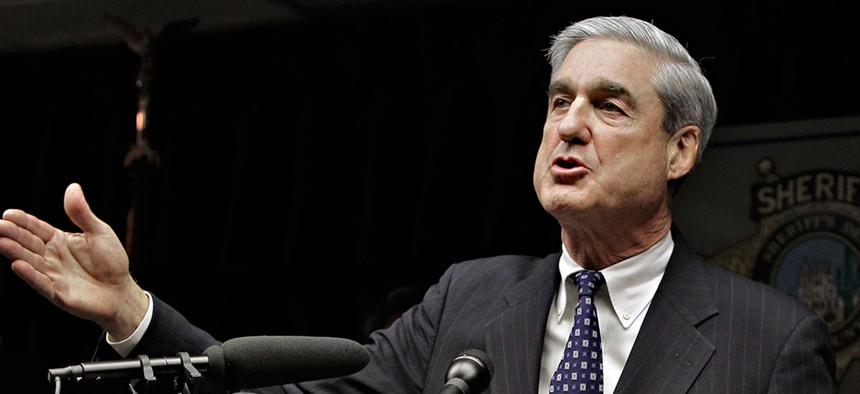What Is Robert Mueller Looking For?
The New York Times reports that the special counsel has demanded records from the Trump Organization.
Thursday afternoon, The New York Times broke the news that Special Counsel Robert Mueller, who is investigating whether the Trump campaign assisted Russian operation to swing the 2016 election to the president, had issued a subpoena for the Trump Organization’s records. The subpoena reportedly “ordered the Trump Organization to hand over all records related to Russia and other topics [Mueller] is investigating.”
The president has previously implied that he could fire Mueller if the special counsel began investigating Trump’s businesses. As the Times reports, “the subpoena comes as Mr. Mueller appears to be broadening his investigation to examine the role foreign money may have played in funding Mr. Trump’s political activities,” in particular from the United Arab Emirates.
Former prosecutors and defense attorneys stressed to me that Mueller issuing a subpoena was standard for a white-collar investigation. Although the scope of the subpoena is unknown, given the breadth of Mueller’s inquiry, it was inevitable that he would look for Trump Organization records, given the possibility that doing so might provide evidence that the Trump campaign aided the Russian effort.
“I wouldn’t say it’s particularly aggressive given the scope of the investigation,” said Elkan Abramowitz, a partner at Morvillo Abramowitz who has been both a prosecutor and defense attorney in white-collar cases.
“I would say a subpoena to the Trump Organization would be pretty much standard operating procedure and not a surprise,” said Randall Eliason, a former U.S. Attorney who specialized in white-collar crime and a law professor at George Washington University. “This is how grand-jury investigations operate.”
Mueller may have already learned a great deal about the Trump Organization’s financial practices from outside firms—such as banks—that the company has done business with. But internal Trump Organization documents would show how the company itself treated such transactions. The subpoena could also give investigators a glimpse at things like call records, employee calendars, internal memorandums, and communications that would be difficult to get elsewhere. If Mueller is indeed investigating whether money from the UAE was illegally funding Trump political efforts, internal documents from the Trump Organization could confirm that one way or the other.
“If they’ve interviewed people about what certain transactions were about, they’d want to know if they had information that contradicts or confirms it,” said Abramowitz. “What they’re probably looking at is where the money’s coming from, to see if it is coming from Russia, or other sources.”
The Trump Organization could seek to fight or narrow the subpoena, a legal battle that would take place out of public view because of the ongoing grand-jury investigation. But Bruce Green, a former prosecutor and law professor at Fordham University, said that Mueller would most likely prevail.
“Companies sometimes complain that the grand jury is engaged in a ‘fishing expedition,’ but courts ordinarily have no patience for this assertion,” said Green. “It would ring particularly hollow here, where the special counsel has already secured indictments and guilty pleas.”
At least 19 people have pleaded guilty or been indicted in the investigation, including close Trump associates such as the president’s former campaign manager, Paul Manafort, and Michael Flynn, who briefly served as the Trump national-security adviser. But the subpoena does not necessarily mean that Mueller is closing in on Trump himself.
“In white-collar cases, the usual exhortation is follow the money,” said Julie Rose O’Sullivan, a law professor at Georgetown University who has worked on both the prosecution and defense side of white collar cases. “Here, to the extent they’re following the money, it’s an obvious step to subpoena the Trump Organization.”



